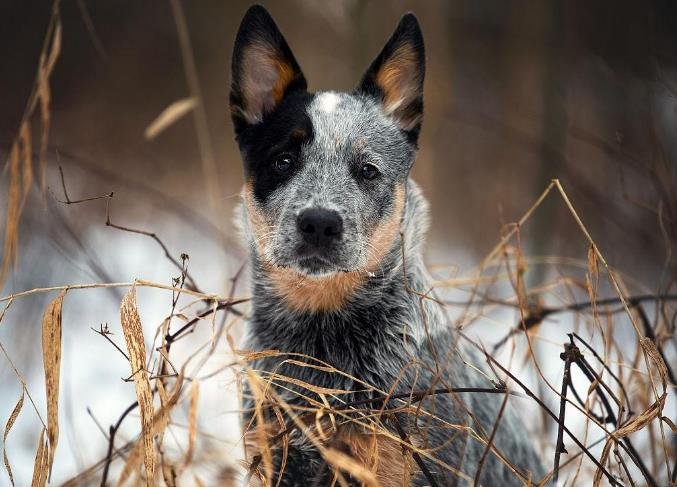
How to Care for an Australian Cattle Dog
Caring for an Australian Cattle Dog involves meeting their physical, mental, and emotional needs to ensure they are healthy, happy, and well-behaved. Here are some key aspects of their care:
Physical Care
Exercise:
Daily Activity: Australian Cattle Dogs are highly energetic and require at least 1-2 hours of vigorous exercise daily. This can include walks, runs, hikes, or playing fetch.
Mental Stimulation: Engage them in activities that challenge their intelligence, such as agility training, obedience training, or puzzle toys.
Diet:
High-Quality Food: Provide a balanced diet with high-quality commercial dog food or a vet-approved homemade diet.
Portion Control: Feed them according to their age, weight, and activity level to prevent obesity.
Fresh Water: Ensure they have access to fresh water at all times.
Grooming:
Brushing: Brush their coat weekly to remove loose hair and reduce shedding.
Bathing: Bathe them as needed, typically every few months or when they get particularly dirty.
Nail Trimming: Trim their nails regularly to prevent overgrowth and splitting.
Dental Care: Brush their teeth several times a week and provide dental chews to maintain oral health.
Health Check-ups:

Veterinary Visits: Schedule regular check-ups with the vet to monitor their health, get vaccinations, and address any medical concerns.
Parasite Control: Use preventative treatments for fleas, ticks, and worms.
Mental and Emotional Care
Training:
Basic Commands: Teach basic commands like sit, stay, come, and heel.
Advanced Training: Consider advanced training or dog sports to keep their mind engaged.
Consistency and Patience: Be consistent with commands and use positive reinforcement methods.
Socialization:
Early Exposure: Socialize them from a young age with different people, environments, and other animals to prevent fearfulness and aggression.
Ongoing Interaction: Continue socializing throughout their life to maintain good behavior.
Attention and Affection:
Bonding Time: Spend quality time with them daily to strengthen your bond.
Toys and Games: Provide a variety of toys and engage in interactive games to keep them entertained.
Environment
Secure Yard: Ensure they have a secure, fenced area to play in as they can be escape artists.
Safe Space: Provide a safe, comfortable space indoors where they can relax and sleep.
Special Considerations
Working Instincts: They have strong herding instincts, so they may try to herd people or other pets. Proper training can help manage this behavior.
Mental Health: Be mindful of their mental health, as boredom or lack of activity can lead to destructive behavior or anxiety.
By following these guidelines, you can ensure your Australian Cattle Dog is well-cared for and lives a happy, healthy life.
American Dingo animal behavior Budget Tips canine behavior Canine Care Canine Health Dehydration dog age dog behavior Dog Breeds dog care Dog Care Tips dog exercise dog flea treatment Dog Food Dog Grooming dog health dog nutrition dog ownership Dog Sleep Tips Dog Training Dog Wound Care Family Pets First Aid Giardia Prevention Healthy Pets Hunting Dogs newborn puppy care Parasites in Dogs Pet Care Pet Care Tips Pet Health Pet Safety pet tips pet training Positive Reinforcement Potty Training prevent flea bites Puppy Care puppy health Puppy Training Rabies in Dogs Training Tips veterinary advice Veterinary Care
-
 How to Tell If Your Dog Has a Broken Bone
5 views
How to Tell If Your Dog Has a Broken Bone
5 views -
 Which is the best way to keep a small dog
4 views
Which is the best way to keep a small dog
4 views -
 Why Do Dogs Eat Rabbit Poop?
3 views
Why Do Dogs Eat Rabbit Poop?
3 views -
 How to Tell if Your Dog is in Pain: Key Signs and Symptoms
3 views
How to Tell if Your Dog is in Pain: Key Signs and Symptoms
3 views -
 How to Clean a Dog’s Wound: A Step-by-Step Guide
3 views
How to Clean a Dog’s Wound: A Step-by-Step Guide
3 views -
 Why Do Dogs Lay in the Sun? 6 Possible Reasons
3 views
Why Do Dogs Lay in the Sun? 6 Possible Reasons
3 views -
 Why Do Dogs Chase Cats? Understanding the Age-Old Rivalry
3 views
Why Do Dogs Chase Cats? Understanding the Age-Old Rivalry
3 views -
 How to Use an Ehmer Sling: A Comprehensive Guide
3 views
How to Use an Ehmer Sling: A Comprehensive Guide
3 views -
 Detailed methods for raising Tosa dogs
3 views
Detailed methods for raising Tosa dogs
3 views -
 Understanding Why Dogs Lick Their Owners’ Privates
3 views
Understanding Why Dogs Lick Their Owners’ Privates
3 views










Leave a Reply
You must be logged in to post a comment.